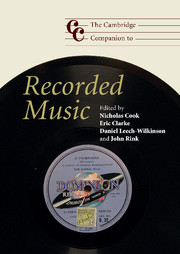Book contents
- Frontmatter
- Introduction
- Learning to live with recording
- A short take in praise of long takes
- 1 Performing for (and against) the microphone
- Producing a credible vocal
- ‘It could have happened’: The evolution of music construction
- 2 Recording practices and the role of the producer
- Still small voices
- Broadening horizons: ‘Performance’ in the studio
- 3 Getting sounds: The art of sound engineering
- Limitations and creativity in recording and performance
- Records and recordings in post-punk England, 1978–80
- 4 The politics of the recording studio: A case study from South Africa
- From Lanza to Lassus
- 5 From wind-up to iPod: Techno-cultures of listening
- A matter of circumstance: On experiencing recordings
- 6 Selling sounds: Recordings and the record business
- Revisiting concert life in the mid-century: The survival of acetate discs
- 7 The development of recording technologies
- Raiders of the lost archive
- The original cast recording of West Side Story
- 8 The recorded document: Interpretation and discography
- One man's approach to remastering
- Technology, the studio, music
- Reminder: A recording is not a performance
- 9 Methods for analysing recordings
- 10 Recordings and histories of performance style
- Recreating history: A clarinettist's retrospective
- 11 Going critical: Writing about recordings
- Something in the air
- Afterword: Recording: From reproduction to representation to remediation
- Notes
- Bibliography
- Discography
- Index
Introduction
Published online by Cambridge University Press: 28 September 2011
- Frontmatter
- Introduction
- Learning to live with recording
- A short take in praise of long takes
- 1 Performing for (and against) the microphone
- Producing a credible vocal
- ‘It could have happened’: The evolution of music construction
- 2 Recording practices and the role of the producer
- Still small voices
- Broadening horizons: ‘Performance’ in the studio
- 3 Getting sounds: The art of sound engineering
- Limitations and creativity in recording and performance
- Records and recordings in post-punk England, 1978–80
- 4 The politics of the recording studio: A case study from South Africa
- From Lanza to Lassus
- 5 From wind-up to iPod: Techno-cultures of listening
- A matter of circumstance: On experiencing recordings
- 6 Selling sounds: Recordings and the record business
- Revisiting concert life in the mid-century: The survival of acetate discs
- 7 The development of recording technologies
- Raiders of the lost archive
- The original cast recording of West Side Story
- 8 The recorded document: Interpretation and discography
- One man's approach to remastering
- Technology, the studio, music
- Reminder: A recording is not a performance
- 9 Methods for analysing recordings
- 10 Recordings and histories of performance style
- Recreating history: A clarinettist's retrospective
- 11 Going critical: Writing about recordings
- Something in the air
- Afterword: Recording: From reproduction to representation to remediation
- Notes
- Bibliography
- Discography
- Index
Summary
The Cambridge Companion to Recorded Music is a very broad title. On one interpretation it might take in just about all popular music, the development of which was largely conditioned by recording; on another you might expect an annotated guide to the recorded repertory. We are offering neither of these. Our aim is rather to promote an understanding of the ways in which recording has both reflected and shaped music throughout the twentieth century and into the twenty-first: that is, how it has reflected and shaped not just the music itself, but the ways in which it is produced and the ways in which it is heard. That involves a lot of background information about recording and recordings, which we also try to cover. And ‘music’ in this context is a very inclusive term, encompassing the countless different genres of classical and popular music, all of which have been shaped by the development of recording technologies, originally in North America and Europe, and their subsequent spread across the globe. The way in which music has been shaped by recording is not uniform, however, and comparison of the impact of recording on different classical and popular traditions brings home the variety of conceptions that exists of what recorded music is and might be.
The appearance of this Companion is a symptom of – and, we hope, will further contribute to – the increasing interest of musicologists in music as performance. To someone outside musicology it might be odd to think of it as anything else, but the traditional focus on scores as the repositories of compositional creativity has led musicologists to think of performance as something that happens after the event, so to speak, rather than being a creative practice in its own right. It also signals the discipline’s increasing concern with reception, with the way in which music is given meaning in the act of listening to it, and in the other acts that are informed by listening, ranging from dancing to it to writing about it: recording has fundamentally changed the reception of music, in terms of its nature, its conditions, the places where it happens.
- Type
- Chapter
- Information
- The Cambridge Companion to Recorded Music , pp. 1 - 9Publisher: Cambridge University PressPrint publication year: 2009
- 1
- Cited by



